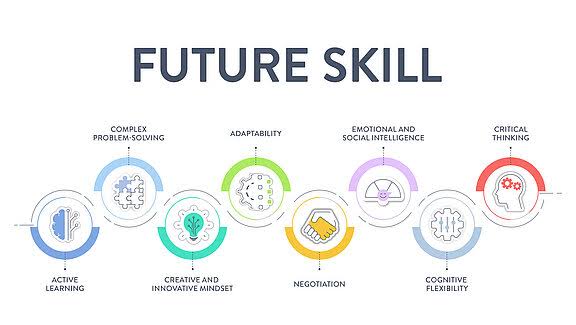The future of work is not just about acquiring technical knowledge, but also about cultivating a mindset of agility, empathy, and innovation. T
As the world of work continues to evolve rapidly in 2025, the skills required to thrive in the modern workforce are shifting away from traditional roles toward more interdisciplinary, digital-first, and human-centric competencies. Technological disruption, artificial intelligence, automation, remote work, and changing business models have transformed the expectations placed on workers across every industry. To stay competitive, individuals must now develop a blend of technical, cognitive, and interpersonal skills. Below are the top ten emerging skills expected to be essential in shaping the future of work over the next decade.
10. Data Literacy
Data has become the lifeblood of modern business operations, and being able to understand, analyze, and make decisions from data is a core requirement across many roles. Data literacy is no longer reserved for data scientists or analysts; it has become a necessary skill for marketers, HR professionals, project managers, and even educators. As tools become more sophisticated, employees need to be able to interpret dashboards, understand key metrics, and use data to drive strategy. By 2025, data storytelling—the ability to explain insights clearly—is equally as important as data interpretation itself.
9. Adaptability And Resilience
In an era defined by constant change, adaptability and resilience are among the most crucial human skills. The COVID-19 pandemic showed how quickly industries could be disrupted, and more recently, geopolitical tensions, economic volatility, and technological shifts have reinforced the need for workers who can pivot quickly and continue to perform in uncertain environments. Adaptability includes being open to learning new tools, navigating new team structures, and embracing unfamiliar tasks. Resilience involves the emotional strength to recover from setbacks and maintain productivity and a positive outlook.
8. Cross-cultural Competence
With globalization and remote work removing traditional boundaries, employees increasingly work with colleagues, clients, and partners from diverse cultural backgrounds. Cross-cultural competence—the ability to effectively communicate and collaborate across different cultures—is essential for minimizing misunderstandings, building strong relationships, and enhancing inclusivity. In 2025, this skill goes beyond language proficiency. It requires emotional intelligence, cultural awareness, and the ability to adapt behavior and expectations based on cultural context.
7. Ethical Thinking And Digital Responsibility
As artificial intelligence, biometric data, surveillance technologies, and algorithmic decision-making become more prevalent, the need for ethical oversight has grown dramatically. Ethical thinking involves evaluating the implications of technology, data use, and organizational decisions on society, privacy, and the environment. Digital responsibility extends to personal behavior online, cybersecurity awareness, and understanding the ethical boundaries of using digital tools. Organizations increasingly value employees who consider the long-term consequences of innovation and advocate for fairness, transparency, and accountability.
6. Creativity And Innovation
Contrary to the myth that machines will eliminate creative work, the rise of automation has made human creativity even more valuable. Innovation—the ability to generate novel solutions to complex problems—is vital for product development, marketing, customer experience, and internal operations. Creativity in the workplace today involves combining disparate ideas, experimenting with new approaches, and applying unconventional thinking to real-world challenges. In 2025, creativity is closely tied to the use of emerging technologies like generative AI, augmented reality, and 3D design tools.
5. Emotional Intelligence
Emotional intelligence (EQ) refers to the capacity to recognize, understand, and manage one’s own emotions while also empathizing with others. As automation takes over repetitive tasks, the uniquely human ability to build trust, resolve conflict, and lead with empathy becomes more critical. Managers and team leaders with high EQ are better equipped to engage teams, handle stress, and maintain morale. In hybrid work environments, where communication cues are often missed, emotional intelligence helps bridge gaps and foster a supportive culture.
4. Digital Fluency
Digital fluency goes beyond basic computer skills or using popular apps. It involves the ability to learn, adopt, and maximize the use of digital tools across multiple platforms. In 2025, this includes proficiency with AI-powered tools, remote collaboration platforms, cloud-based project management systems, data visualization software, and cybersecurity protocols. Being digitally fluent means staying up to date with evolving technologies and knowing how to leverage them to improve workflow, productivity, and innovation. Companies now expect every team member—not just IT departments—to be proactive about digital adoption.
3. Critical Thinking And Problem-solving
As information becomes more abundant and misinformation spreads easily, critical thinking is essential. Workers must be able to assess sources, evaluate evidence, challenge assumptions, and make informed decisions. Problem-solving skills go hand-in-hand with critical thinking, especially in roles that require analysis, troubleshooting, or systems design. In a fast-paced, data-rich environment, professionals must synthesize complex information and find practical, ethical solutions under pressure. This makes critical thinking a highly sought-after cognitive skill in every sector, from healthcare to logistics to education.
2. Technological Literacy And AI Integration
Understanding how technologies like artificial intelligence, blockchain, Internet of Things (IoT), and robotics affect your industry is no longer optional. While not everyone needs to be a coder, having a working knowledge of how AI systems operate, how algorithms make decisions, and how automation impacts workflow is crucial. In 2025, jobs increasingly involve working alongside intelligent systems, requiring people to train, monitor, or interpret AI outputs. Professionals who can bridge the gap between human needs and machine capabilities will be indispensable.
1. Self-leadership And Lifelong Learning
At the top of the list is self-leadership—the ability to take initiative, manage time effectively, stay motivated, and continuously develop one’s own skills. In a world where job roles evolve rapidly, the only way to remain relevant is through lifelong learning. Self-leaders embrace learning as an ongoing habit, actively seeking knowledge, experimenting with new tools, and adapting to change without external direction. Companies are now prioritizing talent with a growth mindset, who are capable of independently upskilling in line with market needs.
